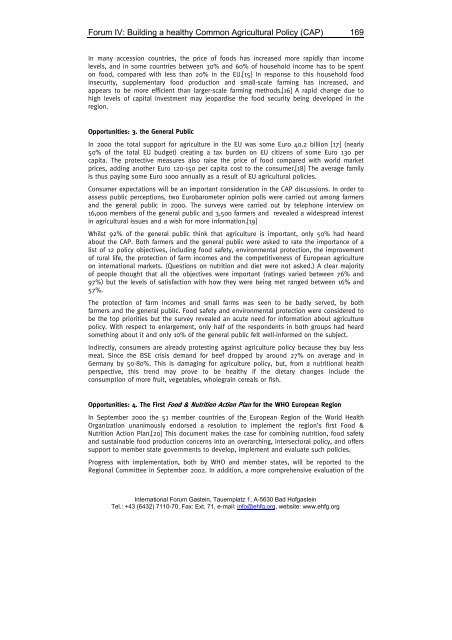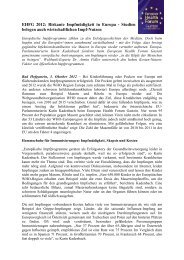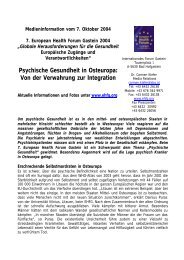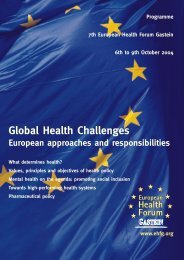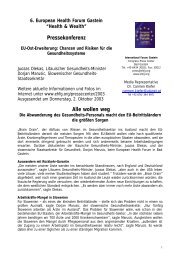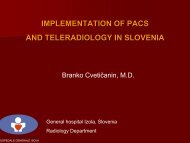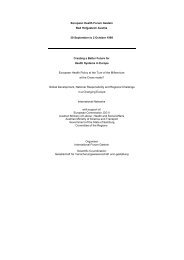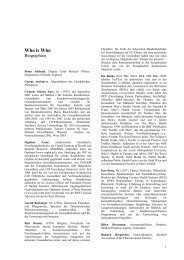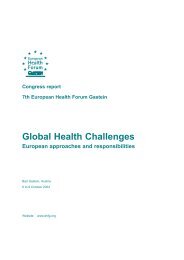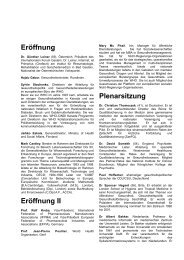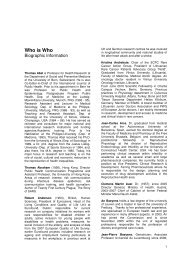Congress report - European Health Forum Gastein
Congress report - European Health Forum Gastein
Congress report - European Health Forum Gastein
Create successful ePaper yourself
Turn your PDF publications into a flip-book with our unique Google optimized e-Paper software.
<strong>Forum</strong> IV: Building a healthy Common Agricultural Policy (CAP)<br />
In many accession countries, the price of foods has increased more rapidly than income<br />
levels, and in some countries between 30% and 60% of household income has to be spent<br />
on food, compared with less than 20% in the EU.[15] In response to this household food<br />
insecurity, supplementary food production and small-scale farming has increased, and<br />
appears to be more efficient than larger-scale farming methods.[16] A rapid change due to<br />
high levels of capital investment may jeopardise the food security being developed in the<br />
region.<br />
Opportunities: 3. the General Public<br />
In 2000 the total support for agriculture in the EU was some Euro 40.2 billion [17] (nearly<br />
50% of the total EU budget) creating a tax burden on EU citizens of some Euro 130 per<br />
capita. The protective measures also raise the price of food compared with world market<br />
prices, adding another Euro 120-150 per capita cost to the consumer.[18] The average family<br />
is thus paying some Euro 1000 annually as a result of EU agricultural policies.<br />
Consumer expectations will be an important consideration in the CAP discussions. In order to<br />
assess public perceptions, two Eurobarometer opinion polls were carried out among farmers<br />
and the general public in 2000. The surveys were carried out by telephone interview on<br />
16,000 members of the general public and 3,500 farmers and revealed a widespread interest<br />
in agricultural issues and a wish for more information.[19]<br />
Whilst 92% of the general public think that agriculture is important, only 50% had heard<br />
about the CAP. Both farmers and the general public were asked to rate the importance of a<br />
list of 12 policy objectives, including food safety, environmental protection, the improvement<br />
of rural life, the protection of farm incomes and the competitiveness of <strong>European</strong> agriculture<br />
on international markets. (Questions on nutrition and diet were not asked.) A clear majority<br />
of people thought that all the objectives were important (ratings varied between 76% and<br />
97%) but the levels of satisfaction with how they were being met ranged between 16% and<br />
57%.<br />
The protection of farm incomes and small farms was seen to be badly served, by both<br />
farmers and the general public. Food safety and environmental protection were considered to<br />
be the top priorities but the survey revealed an acute need for information about agriculture<br />
policy. With respect to enlargement, only half of the respondents in both groups had heard<br />
something about it and only 10% of the general public felt well-informed on the subject.<br />
Indirectly, consumers are already protesting against agriculture policy because they buy less<br />
meat. Since the BSE crisis demand for beef dropped by around 27% on average and in<br />
Germany by 50-80%. This is damaging for agriculture policy, but, from a nutritional health<br />
perspective, this trend may prove to be healthy if the dietary changes include the<br />
consumption of more fruit, vegetables, wholegrain cereals or fish.<br />
Opportunities: 4. The First Food & Nutrition Action Plan for the WHO <strong>European</strong> Region<br />
In September 2000 the 51 member countries of the <strong>European</strong> Region of the World <strong>Health</strong><br />
Organization unanimously endorsed a resolution to implement the region’s first Food &<br />
Nutrition Action Plan.[20] This document makes the case for combining nutrition, food safety<br />
and sustainable food production concerns into an overarching, intersectoral policy, and offers<br />
support to member state governments to develop, implement and evaluate such policies.<br />
Progress with implementation, both by WHO and member states, will be <strong>report</strong>ed to the<br />
Regional Committee in September 2002. In addition, a more comprehensive evaluation of the<br />
International <strong>Forum</strong> <strong>Gastein</strong>, Tauernplatz 1, A-5630 Bad Hofgastein<br />
Tel.: +43 (6432) 7110-70, Fax: Ext. 71, e-mail: info@ehfg.org, website: www.ehfg.org<br />
169


